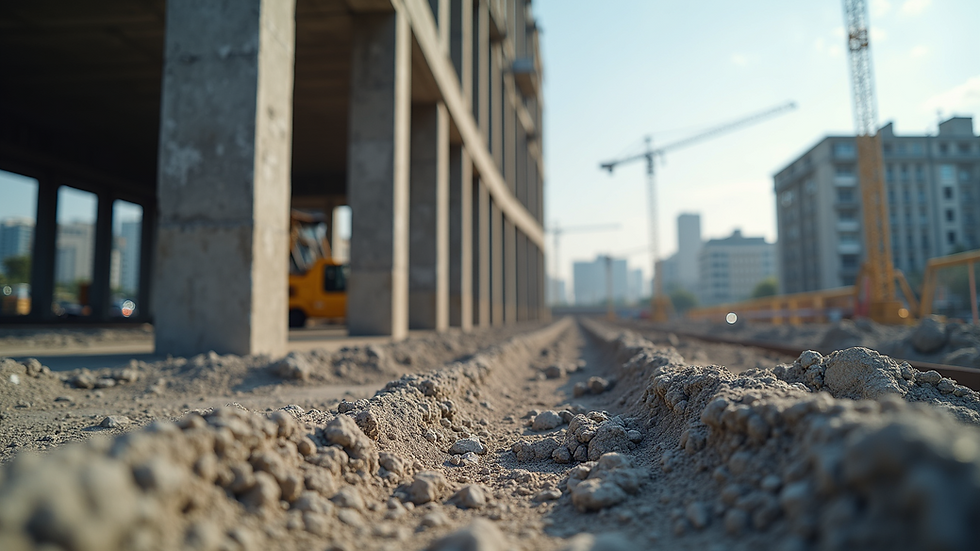Exploring the Role of AI in Mitigating Risks in Construction Projects of the Future
- waddelljames
- May 19, 2025
- 4 min read
The construction industry faces myriad challenges that can lead to project failures, including budget overruns, delays, safety issues, and miscommunication. However, as we look ahead, artificial intelligence (AI) stands out as a solution to reduce these risks and improve project outcomes. By integrating AI into construction processes, companies can better predict failures, streamline workflows, and ensure compliance with safety regulations.
In this blog post, we will explore how AI is set to transform the construction sector by addressing potential failures, refining scheduling, enhancing communication, and improving safety.
The Landscape of Construction Project Failures
Construction project failures often stem from issues like poor planning and unexpected site conditions. A significant disconnect between teams and stakeholders can further exacerbate these challenges. A study by the McKinsey Global Institute found that up to $1.6 trillion is wasted globally each year due to inefficient practices in construction. This staggering figure highlights the urgent need for effective risk mitigation strategies.
AI has the potential to address critical issues effectively. For example, projects that incorporate AI-driven risk assessments can reduce cost overruns by around 20%. This approach encourages construction firms to prioritize AI as a means to overcome traditional hurdles.
How AI Analyzes Historical Data
AI excels at analyzing extensive historical data. By examining previous project data, it can identify patterns and common pitfalls that contribute to failures. This capability allows project managers to foresee challenges based on past performance, making proactive adjustments more viable.
For example, if an AI system identifies that projects in a specific region consistently experience delays due to weather conditions, teams can plan accordingly. Utilizing AI in this way leads to informed decision-making, enhancing project reliability overall.
Streamlining Project Scheduling with AI
Effective scheduling is crucial in construction. Delays can incur substantial financial costs. AI can optimize schedules by analyzing factors such as resource availability and past project performance.
For instance, machine learning algorithms can assess construction projects from the last five years in similar settings. They can then suggest realistic timelines while accounting for seasonal weather patterns and available labor forces. This analysis often results in a 15-25% increase in on-time project delivery.
Additionally, AI tools can alert project managers about prospective delays based on evolving data, enabling timely adjustments that keep projects on track.
Enhancing Communication with AI-Driven Platforms
Communication challenges among stakeholders frequently lead to misunderstandings or project failures. AI can improve this communication through intelligent platforms designed to summarize key discussions, highlight essential issues, and suggest data-driven solutions.
For example, an AI platform can analyze email exchanges and meeting notes, identifying discrepancies or areas requiring attention. It can also highlight when a team is not adhering to timelines or budgets, prompting quick conversations to resolve these issues. Furthermore, AI chatbots can address team members' frequent questions, streamlining communication and letting managers focus on higher-level priorities.
Optimizing Safety Standards through AI
Safety is paramount in construction. AI enhances safety protocols by scrutinizing site conditions and employee behaviors. Using computer vision, AI can monitor whether workers are wearing safety gear in real-time and detect hazardous conditions on-site.
For instance, AI-driven safety systems can reduce accidents by as much as 30%. If a system identifies potential risks, it can automatically notify safety managers, allowing for quick interventions. Predictive models can even foresee likely accidents based on previous data, prompting essential preventative measures before issues arise.
Improving Quality Control with AI
Quality control is critical for successful construction projects. AI can significantly enhance this area by using machine learning to identify faulty practices and materials that could jeopardize project integrity.
AI systems can inspect construction materials as they arrive on-site, ensuring compliance with specifications. Post-completion, AI can analyze building performance, identifying flaws that could lead to future problems. This continuous feedback loop not only ensures current project integrity but also improves future building practices.
The Role of AI in Predictive Maintenance
Predictive maintenance can greatly benefit from AI's capabilities. Construction equipment fitted with sensors, connected to AI systems, can report its status and predict failures before they occur.
With this predictive maintenance approach, equipment downtime can be reduced by up to 15%. Consequently, construction projects can avoid delays and the associated costs of emergency repairs, all while enhancing the allocation of resources.
The Future of AI in Construction
As the construction landscape evolves, so too will AI's role within it. Ongoing advancements in machine learning and computing power mean that AI will become more adept at providing valuable insights for risk management.
By embracing AI as a strategic partner in project management, construction firms can shift toward a future where risks are anticipated and managed effectively. This shift will ensure projects are completed successfully, within timelines, and budgets.
Looking Ahead
The integration of AI technologies in construction project management shows incredible promise for reducing risks and preventing failures. By leveraging data-driven insights, streamlining workflows, enhancing communication, and bolstering safety standards, construction firms can pave the way for a more efficient and resilient future.
For industry professionals, recognizing AI as an essential tool in project management strategies is crucial. Adopting these technologies could greatly minimize the likelihood of project failures, ensuring that the structures we build meet both time and budget objectives.

In a fast-evolving field like construction, embracing technological advancements is vital for ongoing success and growth.





Comments